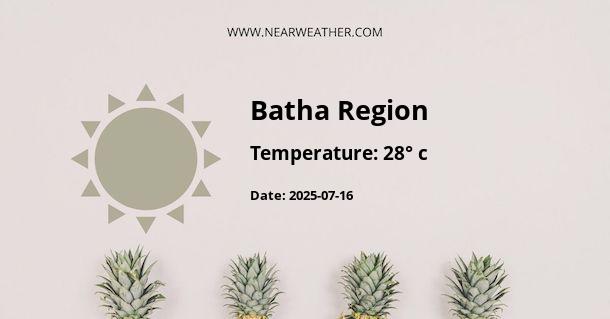Climate and Weather in the Batha Region, Chad
The Batha Region is located in the central part of Chad, in the Sahel region of Africa. It is known for its diverse landscapes, including vast deserts, savannas, and low-lying plains. The region experiences a semi-arid climate with distinct wet and dry seasons. Understanding the climate and weather patterns in the Batha Region is essential for residents and visitors alike.
Seasonal Temperatures
The Batha Region experiences high temperatures throughout the year, with variations between the wet and dry seasons. The dry season, which typically lasts from November to April, is characterized by scorching heat and minimal rainfall. During this period, temperatures can reach as high as 40°C (104°F) during the day. The nights are relatively cooler but still warm, with temperatures averaging around 20-25°C (68-77°F).
The wet season in the Batha Region spans from May to October. During this period, temperatures are slightly lower due to increased cloud cover and rainfall. Daytime temperatures range between 30-35°C (86-95°F), while nighttime temperatures average around 20°C (68°F). The wet season brings relief from the intense heat of the dry season, but humidity levels rise, making it feel warmer.
Precipitation
The Batha Region receives the majority of its annual rainfall during the wet season. The average annual precipitation in the region is around 500-600 millimeters (20-24 inches). Rainfall is generally erratic and sporadic, with some years experiencing more rainfall than others. The heaviest rainfall usually occurs in July and August, with occasional thunderstorms and heavy downpours.
The distribution of rainfall within the Batha Region can vary significantly. In the northern parts, closer to the Sahara Desert, rainfall is generally lower, ranging from 300-400 millimeters (12-16 inches) annually. As you move further south, the rainfall gradually increases, reaching its peak in the southern parts of the region.
Wind Patterns
The Batha Region experiences prevailing winds that influence its weather patterns. During the dry season, hot and dry Harmattan winds blow from the northeast, carrying dust particles from the Sahara Desert. These winds can reduce visibility and create hazy conditions. In contrast, during the wet season, winds shift to a southwesterly direction, bringing moisture-laden air from the Atlantic Ocean.
Climate Challenges
Like many regions in the Sahel, the Batha Region faces climate-related challenges. The semi-arid climate and erratic rainfall patterns make agriculture a challenging endeavor. Droughts and prolonged dry spells can lead to crop failures and water scarcity, impacting the livelihoods of local communities.
The Batha Region is also vulnerable to the impacts of climate change. Rising temperatures and changing rainfall patterns can further exacerbate water scarcity and increase the frequency and intensity of droughts. These climate challenges require sustainable land and water management practices to mitigate their effects and ensure the well-being of the region's inhabitants.
Conclusion
The Batha Region in Chad experiences a semi-arid climate with distinct wet and dry seasons. The dry season brings scorching heat and minimal rainfall, while the wet season provides relief with lower temperatures and increased precipitation. Understanding the climate and weather patterns in the Batha Region is crucial for planning agricultural activities, managing water resources, and adapting to the challenges posed by climate change.
A - Batha Region's Latitude is 14.000000 & Longitude is 19.000000.
A - Weather in Batha Region is 25° today.
A - Climate Conditions in Batha Region shows overcast clouds today.
A - Humidity in Batha Region is 16% today.
A - Wind speed in Batha Region is 17.21 km/h, flowing at 66° wind direction. today.
